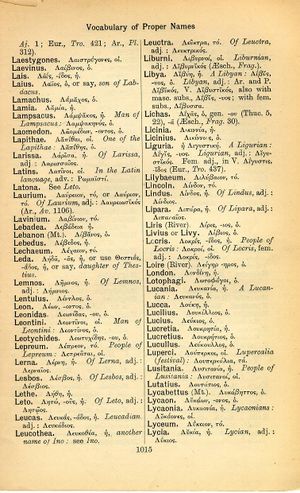Lerna
ὁ αὐτὸς ἔφησε τὸν μὲν ὕπνον ὀλιγοχρόνιον θάνατον, τὸν δὲ θάνατον πολυχρόνιον ὕπνον → Plato said that sleep was a short-lived death but death was a long-lived sleep
English > Greek (Woodhouse)
Λέρνη, ἡ.
Of Lerna, adj.: Λερναῖος.
Latin > English (Lewis & Short)
Lerna: ae, and Lernē, ēs, f., = Λέρνη,
I a forest and marsh near Argos, through which flowed a stream of the same name; the abode of the Lernæan Hydra, which Hercules slew with the help of Iolāus, and then drained the marsh: belua Lernae, Verg. A. 6, 287: anguifera, Stat. S. 2, 181: fecunda veneno, id. Theb. 9, 340: haec dextra Lernam Placavit, Cic. poët. Tusc. 2, 9, 22: et Lerne pulsa tridente palus, Prop. 2, 26, 48 (3, 22, 20), where Müll. Lernae: Lerne, also a town situated there, acc. to Mel. 2, 3, 9.—Hence,
II Lernaeus, a, um, adj., Lernæan: pestis, Lucr. 5, 26: anguis, Verg. A. 8, 300: hydra, Prop. 2, 19, 9: mixtus Lernaei labe veneni, Ov. M. 9, 130: sagittae, with which Hercules killed the Hydra, Luc. 6, 392: cancer, killed by Hercules at the same time with the Hydra, Col. poët. 10, 313. —
B Poet., transf., Argive, Grecian: Lernaei reges, Stat. Th. 5, 499: alumni, id. ib. 4, 638: coloni, id. ib. 3, 461.
Latin > French (Gaffiot 2016)
Lerna,¹³ æ, f., [poet.] Cic. Tusc. 2, 22 ; Virg. En. 6, 287 ; Lernē, ēs, f., *Prop. 2, 26, 48 ; Mela 2, 51, Lerne [marais de l’Argolide où Hercule tua l’Hydre]

